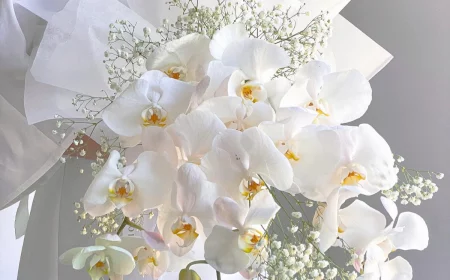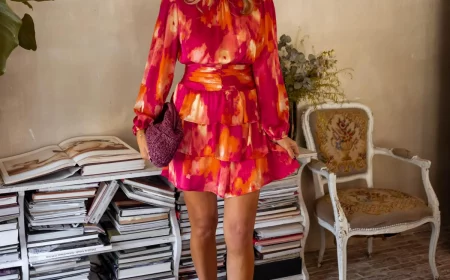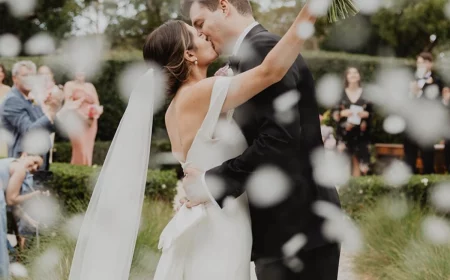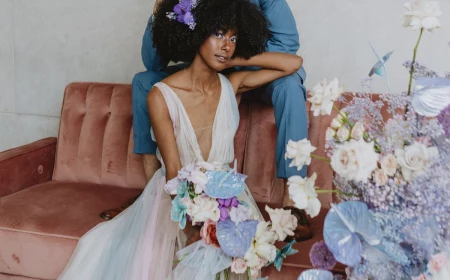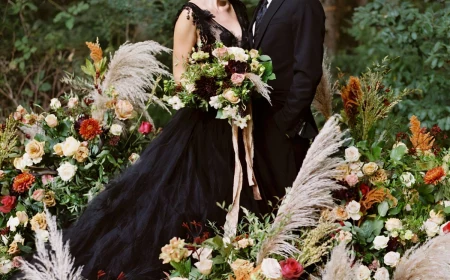The Unfiltered Guide to Black Wedding Cakes: A Pro Baker’s Secrets
I’ve been in the baking world for a long time, and I’ve seen trends come and go. But let me tell you, the black wedding cake isn’t just a trend; it’s a statement. When these started popping up, they felt edgy, almost rebellious. Now? They’re a top request from couples who want something that’s both timelessly elegant and incredibly modern.
In this article
- The Secret to a True, Deep Black Icing
- Buttercream or Fondant: Which Finish is for You?
- Pro Techniques for a Flawless Cake
- Quick Fixes for Common Headaches
- Climate, Location, and That One Time I Almost Lost a Cake
- Let’s Talk Money and Flavors
- The Most Important Chat: Stains and Safety
- So, You Want to Try This at Home?
- Galerie d’inspiration
But here’s the honest truth: making a perfect white cake is a science, but making a flawless black cake is an art form. It’s a completely different ballgame. You’re dealing with challenges that lighter colors just don’t present. I’ve learned these lessons through a lot of trial, error, and a few late-night kitchen disasters. So, this is my brain dump of everything I wish I’d known, from the real chemistry of the color to making sure your guests don’t leave with black-stained teeth. Let’s get into it.
The Secret to a True, Deep Black Icing
First things first, you can’t just dump a bottle of black food coloring into white frosting and call it a day. If you do, you’ll end up with a bitter, grayish mess. Getting that deep, rich black without ruining the taste is all about understanding the ingredients.

So, why is black so tricky? Most food gels are made to tint a pale base. To get a true black, you need a ton of color, which creates problems. Many black gels have a green or blue base, so if you don’t use enough, your cake might look like a murky swamp under the reception hall lights. More importantly, the coloring itself has a taste. Too much of it will give your delicious buttercream a nasty, chemical aftertaste. A lesson I learned the hard way years ago after a client tasting went south.
The single most important trick in the book is this: start with a dark base. Never, ever start with white icing. My go-to is always a rich chocolate buttercream. The cocoa powder gives you a deep brown foundation, so you only need a fraction of the black food coloring to achieve a true black. This saves you money on coloring (which can get pricey) and, crucially, it saves the flavor. The cake still tastes like decadent chocolate, not food dye.

And here’s a pro tip that requires a little patience: let time do the work for you. Black icing gets darker as it sits and oxidizes. If you mix your icing until it looks pitch-black in the bowl, you’ve already gone too far. The right way is to mix it to a dark charcoal gray, cover it, and let it sit. I always make my black icing at least 24 hours ahead of time. The next day, it’s a gorgeous, deep black. Patience is key to avoiding a bitter cake.
Buttercream or Fondant: Which Finish is for You?
The look of a black cake is all about that flawless finish. Both buttercream and fondant can be stunning, but they are very different to work with and wear. Imperfections are way more obvious on a dark surface, so your technique has to be on point.
Black Buttercream: This gives you a softer, richer look. I prefer using a meringue-based buttercream (like Swiss or Italian) because it’s super stable, but a good old American buttercream works too if it’s made well.

- The Taste & Feel: Generally preferred by guests, it’s soft and delicious. The finish can range from textured to impressively smooth.
- The Difficulty: Honestly, it’s tricky. Getting sharp, clean edges takes practice. It’s also incredibly messy. Black buttercream will stain your hands, clothes, and tools. Quick tip: wear disposable gloves and have a set of dedicated bowls and spatulas just for dark colors.
- Cost: The ingredients are generally cheaper than pre-made fondant, but it can be more labor-intensive.
- Humidity: This is its weakness. In a humid room, black buttercream can get soft and a little droopy.
Black Fondant: This is your ticket to a perfectly smooth, almost sculptural finish. While you can knead black dye into white fondant, I really advise against it for covering a whole cake. It’s almost impossible to get an even color, and you’ll wreck the fondant’s texture, making it sticky and prone to tearing.
- The Taste & Feel: Fondant has a unique, chewy texture and a sweet, often vanilla-like flavor. The finish is unmatched—perfectly smooth with a matte or satin look.
- The Difficulty: The challenge here is application. You have to work quickly to avoid cracks or “elephant skin.” But the learning curve might be a bit gentler for getting a clean look.
- Cost: Buying high-quality, pre-colored black fondant is the way to go, and it’s more expensive. A 2lb tub from a professional brand will typically run you between $15 and $20 at a cake supply store or online.
- Humidity: It holds up better than buttercream in humidity, but it can still get sticky or shiny if the air is really heavy.

Pro Techniques for a Flawless Cake
Ready for a few trade secrets? Whether you choose buttercream or fondant, these are the little things that make a big difference.
For that super-sharp buttercream edge, here’s the method: after your final coat, chill the cake in the fridge for at least 30 minutes until the icing is firm. Then, take a metal bench scraper and heat it up. My trick is to keep a tall vase of very hot water nearby. I dip the scraper for a few seconds, wipe it completely dry with a paper towel, and then make one long, smooth pass on the cake. The heat melts the very top layer, giving you a finish as smooth as glass.
If you’re using fondant, buy the pre-colored black stuff. Seriously. It will save you so much heartache. Even then, you need to knead it on a surface lightly dusted with cornstarch to make it pliable. When you’re smoothing it onto the cake, use a pair of plastic fondant smoothers to buff out any fingerprints and get that seamless look.

Quick Fixes for Common Headaches
Things can still go wrong. It happens! Here’s a quick troubleshooting guide.
- “My icing tastes bitter!” Uh oh. You probably added too much color. The best fix is dilution. Mix the bitter batch with a fresh, uncolored batch of chocolate buttercream. This should balance out the flavor without compromising the color too much, especially after it has time to sit and darken.
- “Help, my fondant is cracking!” This is usually because it’s drying out. Knead in a tiny bit of vegetable shortening—about half a teaspoon for every pound of fondant. This adds moisture and elasticity back into it. If it’s cracking on the cake, you’re a bit stuck, but you can sometimes disguise small cracks with decorations or a touch of black royal icing.
Climate, Location, and That One Time I Almost Lost a Cake
A cake doesn’t exist in a bubble. The environment is a huge factor, especially for a dark cake that absorbs more heat.

Humidity is the absolute enemy. I once delivered a stunning black fondant cake to a gorgeous historic venue… with no modern air conditioning. In the middle of July. I watched in horror as the fondant started to develop a sticky sheen. I had to pull the venue manager aside and beg them to put a portable AC unit right next to the cake table. It was a close call! The lesson? If your venue isn’t climate-controlled, a black cake is a huge risk.
Direct sunlight is just as bad. It can melt buttercream and cause fondant to sag in minutes. The cake table MUST be in a fully shaded spot for an outdoor wedding. This is a non-negotiable for me.
Let’s Talk Money and Flavors
I’m always upfront with my clients about this: a black cake typically costs 10-20% more than a similar white one. It’s not an upcharge for the sake of it. The high-quality black fondant and concentrated gel colors (a good bottle of which can run $5-$7) are more expensive. Plus, the labor is more intensive, and the risk of a mistake that requires starting a whole tier over is much higher.

As for what’s inside, you want flavors that stand up to the dramatic exterior. Some pairings that are always a hit:
- Dark Chocolate & Raspberry: A classic for a reason. The tart raspberry cuts the richness of the chocolate.
- Red Velvet & Cream Cheese Filling: The visual is just spectacular when you cut into it. That deep red against the black is a showstopper.
- Lemon & Blackberry: A brighter, surprising option that guests love.
- Almond & Salted Caramel: Sophisticated, nutty, and utterly delicious.
The Most Important Chat: Stains and Safety
This is the conversation I have with every single client. Yes, super-concentrated black icing can temporarily stain your guests’ mouths and teeth. It’s harmless, but you want people to know what to expect! It’s also critical for the couple to be careful during the cake cutting photos. A big smear of black buttercream on a white dress is a photo you don’t want.

A fun pro-tip I share with my couples: have a dark-colored drink like cola or red wine handy for your toast. A quick sip can discreetly rinse away any temporary color before you hit the dance floor!
Oh, and a quick word on ingredients: you might see recipes using activated charcoal for a “natural” black. I strongly advise against this for a large event cake. Activated charcoal can interfere with the absorption of medications, and you have no idea about the health needs of all your guests. It’s a risk that’s just not worth taking. Stick to food-grade colorings from trusted brands.
So, You Want to Try This at Home?
I absolutely admire ambitious home bakers. But a multi-tiered black wedding cake is a high-stakes project that combines complex structure, fickle materials, and advanced techniques. For the most important cake of your life, I truly believe you should trust a licensed and insured professional.

But that doesn’t mean you can’t play! If you want to dip your toes in the water, start small. A fantastic first project is making a batch of black buttercream for Halloween cupcakes. Or, buy a small block of black fondant (about $8-$10) and use cookie cutters to make cool geometric decorations for a store-bought cake. It’s a great way to get a feel for the materials without the pressure of a major event. Have fun with it!
Galerie d’inspiration


Fondant: Offers a perfectly smooth, matte, or satin finish that’s hard to achieve with buttercream. It’s also more stable in warmer temperatures. However, rolling out black fondant without cracks or elephant skin requires skill, and its flavor is not universally loved.
Buttercream: Provides a richer flavor and a softer texture. As the article mentions, starting with a chocolate base is key. It’s more prone to smudges and imperfections, but these can sometimes add to a rustic or textured design.
Ultimately, the choice depends on your desired aesthetic and climate conditions.

In the world of design, black is the color of sophistication, power, and formality. It creates a backdrop that allows other colors and textures to command attention.
This is why black wedding cakes are so striking. They aren’t just dark; they act as a canvas. The vibrant greens of eucalyptus, the shimmer of edible gold, or the pure white of a sugar-flower magnolia become instantly more dramatic and intentional against a deep black base.

How do you prevent guests from leaving with black-stained smiles?
This is the number one practical concern with black icing. A good baker will minimize dye by using a chocolate base, but some staining is inevitable. The best approach is to manage it gracefully. Serve the cake with dark-colored napkins. More importantly, offer palate cleansers alongside each slice: a few raspberries, a sprig of mint, or a small glass of sparkling water can help rinse away the color naturally.

- Your cake arrives at the venue without a single fingerprint or smudge.
- The sharp edges and delicate details are perfectly preserved, even after a bumpy car ride.
The secret? Proper chilling. A black cake, especially buttercream, must be thoroughly chilled until firm to the touch before being boxed for transport. This hardens the surface, making it resistant to minor bumps. Pros use refrigerated vans, but for a DIY delivery, cranking up the car’s AC and placing the cake box on a flat, non-slip mat in the trunk is the next best thing.

The Golden Touch: Applying gold leaf to a black cake is a show-stopping technique. For a clean application, use a soft, dry paintbrush (one dedicated solely to food) to gently pick up the delicate gold sheet and press it onto the chilled buttercream. Never use your fingers, as the warmth and oils will cause the leaf to disintegrate. For a more abstract, brushed-gold effect, mix edible gold dust with a few drops of vodka or lemon extract to create a paint, then flick it onto the cake with a stiff brush.

Did you know that some bakers use black cocoa powder to achieve a deep, natural black?
Unlike standard Dutch-process cocoa, black cocoa powder (the kind used in Oreo cookies) has been heavily alkalized, which darkens its color immensely and neutralizes the chocolate flavor. Using it as a base for buttercream or the cake itself creates an intense, non-bitter black without relying heavily on food dyes from brands like AmeriColor. It’s a flavor and color secret weapon.

A black cake is a statement piece, and its presentation should be just as intentional. The stand you choose is critical.
- For a modern, minimalist vibe: A simple, thin-edged slate or black metal stand creates a seamless, monolithic look.
- For rustic elegance: A thick slice of natural wood with a dark grain provides a warm, organic contrast.
- For high glamour: A polished gold or brass pedestal will echo any metallic details on the cake itself, creating a cohesive and luxurious display.

While a chocolate base is a fantastic starting point, don’t feel limited. The dark, moody aesthetic of a black cake pairs beautifully with sophisticated, less-sweet flavors. Think of an Earl Grey infused sponge with a lemon-curd filling, a rich espresso buttercream, or a spiced cake with a dark cherry or blackberry preserve layer. These complex flavors complement the visual drama.

Important point: Not all black food colorings are created equal. To avoid that dreaded bitter aftertaste or a greenish tint under reception lighting, professionals rely on high-potency gel colorings. Brands like AmeriColor’s Super Black and Chefmaster’s Coal Black are industry standards. They are highly concentrated, meaning you use far less to achieve a true, deep black, which is the key to preserving the delicious flavor of your icing.

Love the drama of black but hesitant to commit to a fully black cake?
Consider the

The black wedding cake trend is particularly strong in Australia and the UK, where it’s seen as a chic alternative to traditional white, representing a couple’s bold and modern identity.
One of the most artistic trends emerging is the ‘Kintsugi’ cake. Inspired by the Japanese art of mending broken pottery with gold lacquer, bakers create cracks or fissures in the black fondant or buttercream and fill them with shimmering, edible gold. It symbolizes embracing flaws and imperfections to create something even more beautiful and resilient—a stunning metaphor for marriage.

